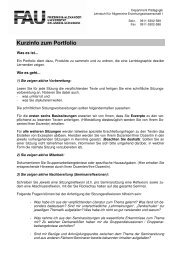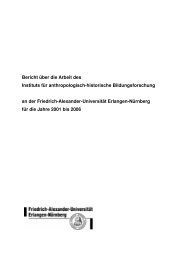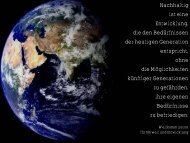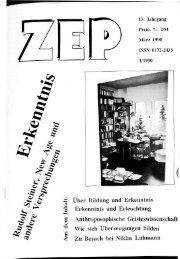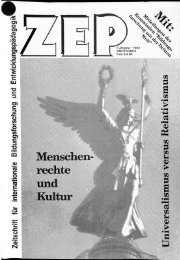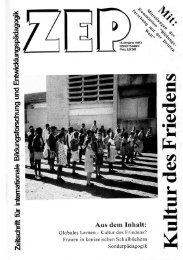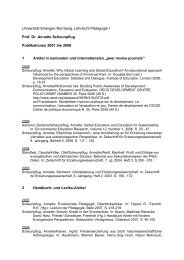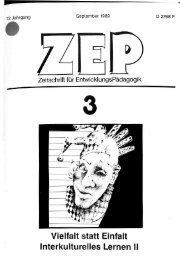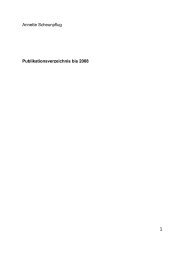ZEP - Lehrstuhl für Allgemeine Erziehungswissenschaft I
ZEP - Lehrstuhl für Allgemeine Erziehungswissenschaft I
ZEP - Lehrstuhl für Allgemeine Erziehungswissenschaft I
Erfolgreiche ePaper selbst erstellen
Machen Sie aus Ihren PDF Publikationen ein blätterbares Flipbook mit unserer einzigartigen Google optimierten e-Paper Software.
<strong>ZEP</strong>30. Jg. Heft 1 März 2007 Seite 19of student-led organisations. Such organisations can, as a resultof these, operate mainly with volunteers and with very lowcosts. However, these contributions are largely side-effects andthe contributions of an HEI towards student-led organisationsand its students within them can be taken much further. Thebenchmarks show that accreditation of development educationprovided by student-led organisations and more participatorycurricula are key to students becoming active global citizens.Student-led organisations are, to an extent, making up for alack of concern for development education and global issuesand for a lack of practical learning in higher education. Manyoffer in-depth understanding of global issues to a very highstandard, sometimes outperforming formal teaching in the eyesof students. Whilst there are good examples of students gainingacademic credit for engaging in student-led organisations, thelearning is seen as extra-curricula and many students struggleto remain engaged. Simply being spoon-fed academic materialdoes not engender a deeper questioning of the world andmore participatory, less rigid, curricula offer this opportunity.International students bring unique perspectives and their contributionscan add a global perspective to any subject. Yet manyHEIs do not capitalise on the learning opportunities here, orworse enforce ‘ghettos’ by separating international students inseparate accommodation or social societies. Global citizenshipcan also be reflected in the ethos of the HEI. Several HEIs haveobtained fair trade status, often as a result of student lobbying.Many actively encourage staff and student volunteering. Thecentral role of universities in creating the society of tomorrowmeans that the opportunity to support students in becomingactive global citizens cannot be missed.Case StudiesFair Trade Food at Warwick UnionThe People & Planet group at Warwick University wanted togain support for its Fairtrade Campaign. They tabled a motionin their Students’ Union stating that 100% of the Union’s foodproducts should be Fairtrade where applicable. The motion waspassed with 79% (of 1,650 voters) in favour. Students havebenefited by seeing how democratic processes can achievepositive results. This activity is distinctive because, havingreceived training and support from People & Planet, studentshave identified where they make use of existing structures andbodies in their locality in order to achieve positive change.Students have gained a greater understanding of democraticprocesses and have seen that small actions to promote fairtradein their university over a number of years have achieved veryhigh levels of support for the issue.The Humanitarian Centre at CambridgeUniversityEngineers Without Borders UK and its members in Cambridgeworked with the university and other NGOs and student-ledgroups in the city to create a centre where resources,networks, services and support could be pooled, shared andsustained. The centre now has staff and office space. Throughthe centre, five student-led organisations offer a one-day courseintroducing international development issues. The course ismulti-disciplinary, is taught by university academics and NGOstaff and, even with 120 places, is always well oversubscribed.It is seeking accreditation. The centre acts as an interfacebetween students and NGOs, promoting best practice andlong-term collaborations that help all participant organisationsachieve their missions.India Film coursework at Leeds UniversityA Development in Action volunteer in Leeds decided to usehis footage from his education project in India to make a promotionalfilm for development in action. The film was used asa promotional tool for Development in Action and was used toraise awareness of their work and to recruit more volunteers.Module Accreditation schemes at ReadingUniversityReading Student Action for Refugees involves social workstudents in a volunteering project with young refugees and asylumseekers. The initiative links community work with academicstudy and puts theory into practice whilst students gain a socialunderstanding of what exists outside the university. The projectties in with university programmes to recognise the voluntarywork of students through accredited training courses on areassuch as welfare advice, leadership and organisation.Fair Trade Cafe at Aberdeen UniversityAberdeen People & Planet group were trying to find ways ofengaging new people in their fairtrade campaign. Students setup a regular fairtrade café, where they served fair-trade drinksand snacks to people who drop-in between lectures. Studentsattending the café have the opportunity to find out more aboutglobal trade issues, how to get involved in campaigning forfairtrade and about their own capacity to make a differencethrough small actions.Recruitment as Awareness RaisingThe Development in Action volunteer recruitment processinvolves a strong element of development education. Therecruitment events reach a large audience of people previouslyunengaged in development issues. Workshops, debates andtalks about issues relating to India, global citizenship and UKactivism form an integral part of the recruitment. Volunteerswho apply are enthused by DiA’s emphasis on awareness-raisingin the UK. These events have a wider appeal, beyond thosewho might be interested in an overseas placement.ConclusionStudents as Active Global Citizens explore, question andengage with global issues; they learn to understand their presentand future responsibilities in tackling global inequality; andthey are empowered to take action for positive social change.Die Autoren sind in dem von DEA (Developement Education Association)initiierten Netzwerk ‚Students As Active Global Citizens’ aktiv sowie inunterschiedlichen studentischen Organisationen tätig: Andrew Lamb beiEngineers Without Borders, Ellen Roberts und Claire Bennett bei Developementin Action und John Kentish bei People and Planet.





